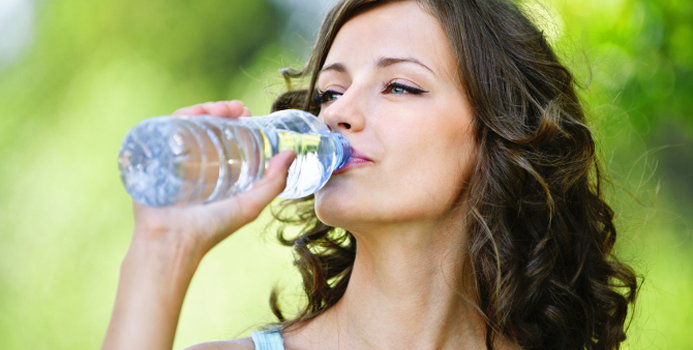Many people don't know how to drink water while exercising so that they don't get stomach cramps. They also don't realize that dehydration can contribute to muscle cramps of all sorts. You need to drink water while you're exercising, as strenuous work can leave you dehydrated. Here are some tips on how you can improve your water drinking technique, so you don't get cramps.
1 Drink Plenty of Water All the Time
To avoid dehydration, the average adult needs six to eight cups of water a day. If you're not drinking adequate amounts of water throughout the day, you'll already be dehydrated when it's time to start exercising. If you exercise while dehydrated, you'll suffer from more cramps. When you're dehydrated, your muscles aren't able to function as well as they should and you'll tire more easily.
Try to drink 16 to 24 ounces of water about an hour before you work out. Don't forget to rehydrate after your workout as well. Your urine should be light yellow, like lemonade; this is a sign that you're adequately rehydrated.
2 Stretch and Warm Up before Exercising
You can avoid many muscle cramps by warming up properly before a workout session. Do some light exercises to warm up your muscles and get them moving. Gentle stretches help to ensure that you're not starting a workout with contracted muscles that could be prone to cramping.
Stretching your muscles periodically throughout the day can keep them loose and prevent many muscle cramps. Also, work out in appropriate loose-fitting clothing. Tight clothing can restrict blood flow, which contributes to cramps.
3 Drink Water in Gulps, Not Sips
Marathon runners know that they should drink water in large gulps, rather than in small sips. While it might seem preferable to take in less fluid by sipping, in fact, gulping water makes your stomach less likely to cramp. The more water you take in at once, the faster your stomach empties itself. That's because a larger quantity of water stimulates your stomach's stretch receptors, causing it to empty itself quickly.
4 Make Sure You're Getting Enough Potassium and Sodium
Many muscle cramps are caused by dietary deficiencies of potassium and sodium. Avoid deficiencies of these minerals by eating bananas and oranges or by taking vitamin supplements. (Always remember that it's preferable to get your vitamins directly from your diet).
5 Keep Your Muscles Strong, and Don't Overdo It
Avoid muscle cramps when exercising by keeping your muscles strong. Work out regularly. Don't push yourself too hard during workouts. If you force your muscles to work harder than they're capable of working, you could suffer from muscle cramps.
6 Breathe Deeply and Stay Relaxed
Many cramps, especially stomach cramps, are actually caused by inadequate oxygenation. When you're working out, especially during aerobic activities like jogging, make sure you breathe deeply and keep any muscles that you're not using relaxed. If it helps to sing or chant while exercising, do it. This will ensure that you're breathing deeply.



